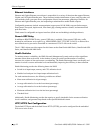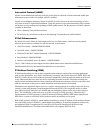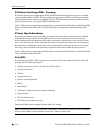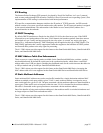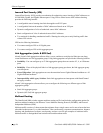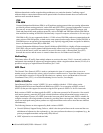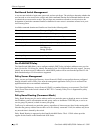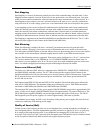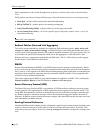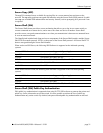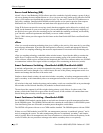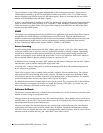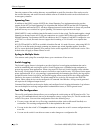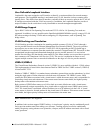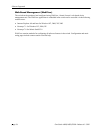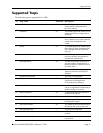
Software Supported
page 30 OmniSwitch 6800/6850/9000—Release 6.1.3.R01
QoS is implemented on the switch through the use of policies, created on the switch or stored in Policy-
View.
While policies may be used in many different types of network scenarios, there are several typical types:
• Basic QoS—includes traffic prioritization and bandwidth shaping
• 802.1p/ToS/DSCP—includes policies for marking and mapping
• Policy Based Routing (PBR)—includes policies for redirecting routed traffic
• Access Control Lists (ACLs)—ACLs are a specific type of QoS policy used for Layer 2, Layer 3/4,
and multicast filtering.
Note. NAT is not supported.
Redirect Policies (Port and Link Aggregate)
Two policy action commands are available for configuring QoS redirection policies: policy action redi-
rect port and policy action redirect linkagg. A redirection policy sends traffic that matches the policy to
a specific port or link aggregate instead of the originally intended destination. This type of policy may use
any condition; the policy action determines which port or link aggregate to which the traffic is sent.
Redirect policies are supported on the OmniSwitch 9000 Series. The 6.1.3.R01 release provides support
for this feature on the OmniSwitch 6850 Series.
RMON
Remote Network Monitoring (RMON) is an SNMP protocol used to manage networks remotely. RMON
probes can be used to collect, interpret, and forward statistical data about network traffic from designated
active ports in a LAN segment to an NMS (Network Management System) application for monitoring and
analyzing without negatively impacting network performance. RMON software is fully integrated in the
software to acquire statistical information.
This feature supports basic RMON 4 group implementation in compliance with RFC 2819, including the
Ethernet Statistics, History (Control & Statistics), Alarms, and Events groups.
Router Discovery Protocol (RDP)
The Router Discovery Protocol (RDP) is an extension of ICMP that allows end hosts to discover routers
on their networks. The implementation of RDP supports the router requirements as defined in RFC 1256.
Using RDP, hosts attached to multicast or broadcast networks send solicitation messages when they start
up. Routers respond to solicitation messages with an advertisement message that contains the router IP
addresses. In addition, routers send advertisement messages when their RDP interface becomes active and
then subsequently at random intervals.
Routing Protocol Preference
OmniSwitch 9000 switches support provide configurable weight for each routing protocol (including static
routes) to control which entry to prefer when two entries exist from different sources. By default, local
routes always have precedence. In the CLI use the ip route-pref command to configure the routing prefer-
ence.



